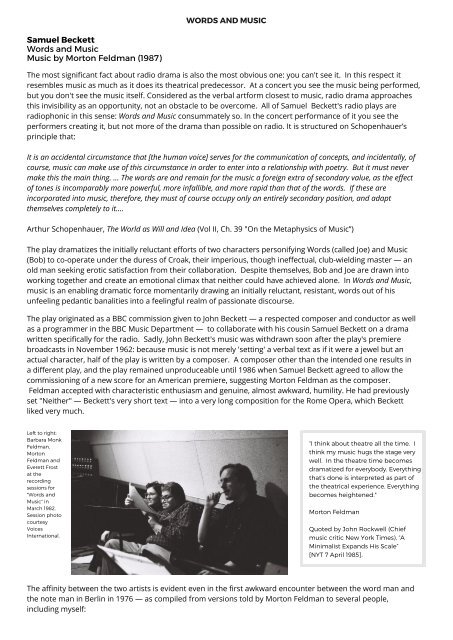Beckett Chamber Music Series 2018 Programme
Beckett Chamber Music Series explores the connection between words and music – thematically, expressively, spatially and temporally – inspired by Samuel Beckett's reduction of artistic expression into a medium which is something in between these two things. The 2018 Series brings together an ensemble of Ireland's finest musicians for intensive musical and artistic discovery, to be shared with audiences in three concert programmes featuring major chamber works by Arnold Schoenberg combined with rarely performed works by Irish composer John Larchet, Swiss composer Frank Martin, a new commission by Irish composer Sebastian Adams, and culminates in a performance of Beckett’s radio play Words and Music with Morton Feldman’s 1987 score. The performance of Words and Music is in collaboration with Everett Frost, who produced and directed the award-winning American national broadcast premieres of Beckett's five completed radio plays and features internationally recognised actors Barry McGovern and Stephen Brennan.
Beckett Chamber Music Series explores the connection between words and music – thematically, expressively, spatially and temporally – inspired by Samuel Beckett's reduction of artistic expression into a medium which is something in between these two things.
The 2018 Series brings together an ensemble of Ireland's finest musicians for intensive musical and artistic discovery, to be shared with audiences in three concert programmes featuring major chamber works by Arnold Schoenberg combined with rarely performed works by Irish composer John Larchet, Swiss composer Frank Martin, a new commission by Irish composer Sebastian Adams, and culminates in a performance of Beckett’s radio play Words and Music with Morton Feldman’s 1987 score. The performance of Words and Music is in collaboration with Everett Frost, who produced and directed the award-winning American national broadcast premieres of Beckett's five completed radio plays and features internationally recognised actors Barry McGovern and Stephen Brennan.
Create successful ePaper yourself
Turn your PDF publications into a flip-book with our unique Google optimized e-Paper software.
The most significant fact about radio drama is also the most obvious one: you can't see it. In this respect it<br />
resembles music as much as it does its theatrical predecessor. At a concert you see the music being performed,<br />
but you don't see the music itself. Considered as the verbal artform closest to music, radio drama approaches<br />
this invisibility as an opportunity, not an obstacle to be overcome. All of Samuel <strong>Beckett</strong>'s radio plays are<br />
radiophonic in this sense: Words and <strong>Music</strong> consummately so. In the concert performance of it you see the<br />
performers creating it, but not more of the drama than possible on radio. It is structured on Schopenhauer’s<br />
principle that:<br />
It is an accidental circumstance that [the human voice] serves for the communication of concepts, and incidentally, of<br />
course, music can make use of this circumstance in order to enter into a relationship with poetry. But it must never<br />
make this the main thing. ... The words are and remain for the music a foreign extra of secondary value, as the effect<br />
of tones is incomparably more powerful, more infallible, and more rapid than that of the words. If these are<br />
incorporated into music, therefore, they must of course occupy only an entirely secondary position, and adapt<br />
themselves completely to it....<br />
Arthur Schopenhauer, The World as Will and Idea (Vol II, Ch. 39 "On the Metaphysics of <strong>Music</strong>”)<br />
The play dramatizes the initially reluctant efforts of two characters personifying Words (called Joe) and <strong>Music</strong><br />
(Bob) to co-operate under the duress of Croak, their imperious, though ineffectual, club-wielding master — an<br />
old man seeking erotic satisfaction from their collaboration. Despite themselves, Bob and Joe are drawn into<br />
working together and create an emotional climax that neither could have achieved alone. In Words and <strong>Music</strong>,<br />
music is an enabling dramatic force momentarily drawing an initially reluctant, resistant, words out of his<br />
unfeeling pedantic banalities into a feelingful realm of passionate discourse.<br />
The play originated as a BBC commission given to John <strong>Beckett</strong> — a respected composer and conductor as well<br />
as a programmer in the BBC <strong>Music</strong> Department — to collaborate with his cousin Samuel <strong>Beckett</strong> on a drama<br />
written specifically for the radio. Sadly, John <strong>Beckett</strong>'s music was withdrawn soon after the play's premiere<br />
broadcasts in November 1962: because music is not merely 'setting' a verbal text as if it were a jewel but an<br />
actual character, half of the play is written by a composer. A composer other than the intended one results in<br />
a different play, and the play remained unproduceable until 1986 when Samuel <strong>Beckett</strong> agreed to allow the<br />
commissioning of a new score for an American premiere, suggesting Morton Feldman as the composer.<br />
Feldman accepted with characteristic enthusiasm and genuine, almost awkward, humility. He had previously<br />
set "Neither" — <strong>Beckett</strong>'s very short text — into a very long composition for the Rome Opera, which <strong>Beckett</strong><br />
liked very much.<br />
The affinity between the two artists is evident even in the first awkward encounter between the word man and<br />
the note man in Berlin in 1976 — as compiled from versions told by Morton Feldman to several people,<br />
including myself:


